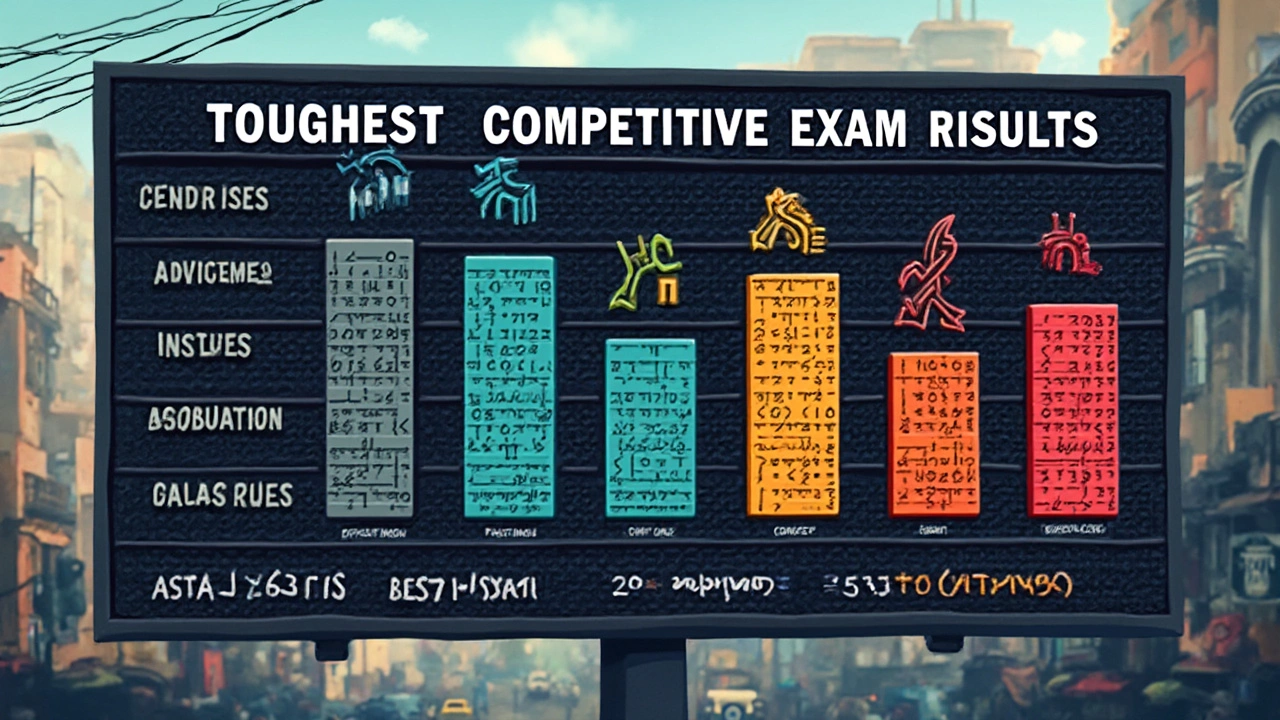Apr
30

- by Dhruv Ainsley
- 0 Comments
Ask anyone going through the grind of state-level competitive exams: not all tests are created equal. You’ll find states where you breeze through with basic prep, and then there are places where even straight-A students stumble and sweat. What makes these state tests so tough, and does it really matter where you take the exam?
Some states throw in wild multiple-choice questions mixed with written responses, while others stick to rote memory. The real surprise? Passing rates can swing from over 80% in one state to under 30% in another, all for the same sort of jobs or licenses. If you're chasing a career that needs licensing—like teaching, law, or nursing—where you take the test isn’t just a detail. It can shape your study plan, your timeline, and even how much you fork out for extra coaching.
Stick around if you want to know which states have the toughest rep and—more importantly—why some places seem set on testing people to their breaking point. I promise it’s more than just tough questions and long hours in a library.
- What Makes a State Test ‘Hard’?
- States That Top the Tough List
- Why Are Some States Tougher Than Others?
- Tips to Tackle the Toughest Exams
- Does ‘Hardest’ Always Mean Best?
What Makes a State Test ‘Hard’?
When people argue over which state has the hardest state tests, it’s not just about how tricky the questions are. There’s a mix of stuff that can turn a regular test into a real headache. Here’s what really ups the difficulty:
- Pass Rates: If only a tiny slice of people pass, you know you’re facing a beast. For example, some law bar exams in California have a pass rate under 40%, while states like Wisconsin clock in at nearly 60%—huge gap for the same license.
- Test Format: Multiple-choice tests feel different from long essays under the clock. States like New York pile on practical scenarios and written responses for teacher certification, while others stick to bubbling answers. More variety? More ways to mess up.
- Content Depth: If your exam dives deep into case studies, research, or local laws (like the Texas medical exams), it’s going to take way more prep than a basic general-knowledge test.
- Changing Rules: Some states update their syllabus often. Just when you think you’ve nailed the material, they drop a new rule or question format. Georgia’s real estate exam is infamous for this.
- Scoring Rigidity: Some states curve scores or allow you to retake sections; others do not. In places like California, it’s all or nothing each time.
Check out how the same type of test can feel way tougher depending on where you take it:
| State | Nursing Pass Rate (2023) | Bar Exam Pass Rate (2023) |
|---|---|---|
| California | 68% | 36% |
| Texas | 87% | 62% |
| New York | 84% | 61% |
So if you’re eyeing a move for a new job, or you just want to pick the right battleground for your competitive exams, don’t just look at how tricky people say an exam is. Dig into what’s actually being tested, how it’s marked, and how often rules change. That’s where the real challenge hides.
States That Top the Tough List
When folks ask, "Which state has the hardest state tests?" you can't just answer with a shrug. There are real numbers and lived experiences here. Some states have a reputation for being especially tough, and it's not just random gossip—there's public data to back it up.
Let's start with California. This state is notorious for its bar exam. It clocks in as one of the toughest in the U.S.—pass rates sometimes sink below 40%. Talk to anyone who’s had to retake it, and they’ll tell you that it’s not just the thick law books or the strange essay prompts. California throws in a unique performance test plus all the regular multi-state sections. The state’s teaching credential exams are no walk in the park either, especially the CSETs for future educators.
New York is another monster. Their Regents exams for high schoolers and their licensing exams, especially for lawyers and teachers, have a solid rep for being tricky. The New York bar had a 62% pass rate in 2024—higher than California’s but still not a cakewalk considering the national average was closer to 70%.
Texas deserves a mention too. The Texas teacher certification (TExES) and legal exams tend to have lower pass rates compared to neighboring states. Plus, Texas throws in state-specific laws and teaching standards on top of national content. If you don’t prep with Texas in mind, you risk getting blindsided.
If you’re looking at medical fields, check out Florida. Their nursing and medical licensing exams often report lower passing rates. Florida’s board exams ask for detailed clinical scenarios—no guesswork here and every answer counts.
Check this out if you like cold, hard numbers:
| State | Test | Recent Pass Rate (%) |
|---|---|---|
| California | Bar Exam | 39.5 |
| New York | Bar Exam | 62.0 |
| Texas | Teacher Certification | 56.8 |
| Florida | Nursing Exam | 64.2 |
The pattern? States pile on extra rules, unique content, and sometimes just a heavier workload. Anyone aiming for competitive exams in these places should plan their study time carefully—and maybe keep the coffee flowing.

Why Are Some States Tougher Than Others?
The short answer? Rules, priorities, and plain old competition. Every state gets to set its own standards and rules for competitive exams, so what you face in California is totally different from what someone deals with in Texas or New York.
Take teacher certification. In New York, wannabe teachers face the Educating All Students (EAS) and Content Specialty Tests—famously tricky for anyone who didn’t grow up in the state’s public school style. Texas, on the other hand, switched to a brand new format in 2021, adding written responses and passing rates dipped for almost every subject.
| State | Exam Type | Recent Pass Rate |
|---|---|---|
| California | Bar Exam | 43% |
| New York | Bar Exam | 63% |
| Texas | Teacher Test | 54% |
Now, why the difference? It comes down to:
- Exam formats: Some states love essays (hello, California bar exam); others lean on multiple choice or practical cases.
- Passing score cut-offs: A pass is 50% somewhere and 70% elsewhere. It makes a world of difference.
- Commitment to filtering talent: Highly competitive states with more job seekers (like New York, California, and Illinois) purposely raise the bar to weed out more folks.
Certain states also tweak exams to match what’s most relevant locally. Tech-heavy regions want stronger computer skills, while rural states might test more practical, community-focused knowledge.
“The test isn’t just about what you know—it’s what the state thinks its professionals should know,” says Dr. Asha Patel, test prep coach and education writer. “And that’s why you see such big swings from state to state.”
So if you’re eyeing states with a tough rep, know it isn’t personal—it’s just their way of making sure only the most prepared get through. That’s what makes hardest state tests a thing folks talk about (and worry about).
Tips to Tackle the Toughest Exams
So, the hardest state tests are staring you down. Don’t freeze. The best test-takers make a plan, stick to the basics, and never rely on last-minute cramming. In the most competitive states—like California for the bar exam, or New York for teacher certification—the process is more like a marathon than a sprint. Here’s how regular people pass, even when the odds look insane.
- Dig up past papers: You can’t predict every question, but older exam papers tell you exactly how a state likes to trip people up. Most official websites or prep forums offer samples. No shortcut beats working through these under timed conditions.
- Stick to a routine: Consistency wins. Spread out study hours instead of pulling one all-nighter. Many toppers swear by the Pomodoro technique—25 minutes on, 5 minutes off—just to keep burnout at bay.
- Watch out for local twists: Some competitive exams throw in state-specific questions you won’t see anywhere else. For example, Texas nursing or teaching licensure adds extra questions about state rules. Don’t skip this section.
- Practice with mock tests: Find a practice test as close as possible to the real deal. Take it under real timing and no cheat sheets. This not only builds stamina but also shows where you run into trouble.
- Join a prep group: Whether you do it online or find friends nearby, study groups keep you motivated. Explaining stuff to someone else is the best test to see if you know your material.
Need proof that this works? Check out this comparison from 2024. States with organized prep resources (think online groups, coaching, and access to mock tests) saw pass rates nudge up—even in places known for brutal pass rates.
| State | Pass Rate 2024 (%) | Often Used Prep Method |
|---|---|---|
| California (Bar Exam) | 33 | Study Groups & Mock Tests |
| New York (Teaching Certification) | 62 | Past Papers & Routine Study |
| Texas (Nursing) | 78 | State-Focused Practice |
Bottom line—no magic hacks. The folks who crack hardest state tests just prep smarter and put in the hours. Stick with it and lean on all the tools your state offers. You’ve got a better shot than you think.

Does ‘Hardest’ Always Mean Best?
It’s easy to think that the hardest state tests automatically pick the best candidates, but that’s not totally true. Sure, tough exams might weed out people who aren’t prepared, but they can also shut out plenty of talented folks who just don’t test well. For example, states like California and New York have teaching credential exams with super low pass rates—sometimes under 40%. But does that always mean teachers there are better? Not really. The best educators aren’t always the ones who ace a super tough test on their first go.
Then there’s the question of fairness. Some hard tests are packed with trick questions or sections that don’t line up with what you’ll actually use in the job. When states chase low pass rates just for bragging rights, it creates more stress and a bigger barrier, especially for people juggling jobs or families while studying. I’ve seen friends who would have made great nurses or teachers miss out, even after spending months in prep courses.
Plus, looking at national stats, there’s barely any proof that states with the hardest exams have higher job performance. A 2023 report from the National Conference of State Legislatures showed no clear connection between strict licensing exams and better outcomes in fields like law enforcement or teaching. Sometimes, all it really guarantees is a shortage of new hires.
So, before you assume the toughest competitive exams mean higher quality, take a step back. What matters more is that a test checks real-world skills you’ll actually use—not just how long you can survive under pressure. If you’re planning to move or retake a license exam, don’t get caught in the hype. Find out if the test matches what you need in the workplace, not just how famous it is for being hard.





